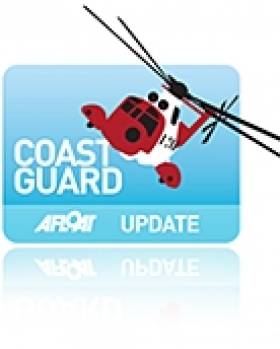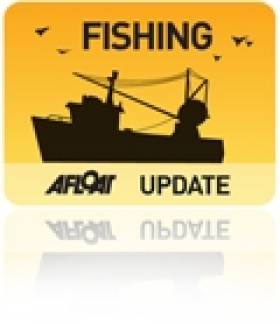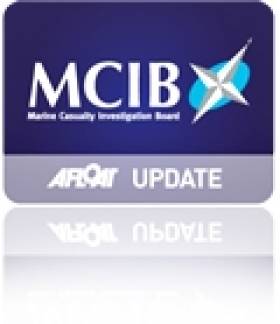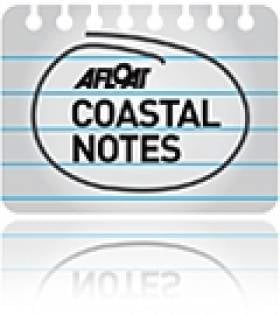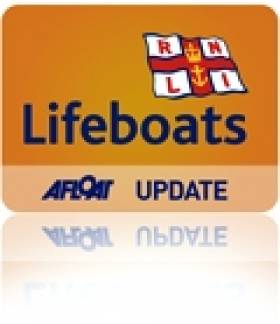Displaying items by tag: Co Cork
Missing Bermuda Yacht Arrives Safely in Co Kerry
A yacht that was reported missing in the Atlantic between Bermuda and Ireland sailed safely into port in Co Kerry this afternoon.
As previously reported on Afloat.ie, the Golden Eagle has been at the centre of an air and sea search operation since failing to arrive at its expected destination of Crookhaven in Co Cork on 15 September.
The yacht - crewed by a 69-year-old Norwegian and a 60-year-old New Zealander - had been out of radio contact since leaving Bermuda in mid August.
But a spokesperson for the Irish Coast Guard has since revealed that the men intentionally turned off their handheld VHF radio to save battery power until they were close to port.
The boat dropped anchor in Portmagee, Co Kerry at 3pm this afternoon, reporting only minor damage to its sails and rigging due to adverse weather which slowed their progress.
More from RTE here.
Fishing Vessel Detained in Cork
The Irish Times reports that the Naval Service detained a Spanish-registered fishing vessel off the Clare coast in the early hours of Tuesday morning.
The vessel was escorted by the LE Niamh to Castletownbere in Co Cork, where it was handed over to gardaí in relation to an alleged breaching of fishing regulations.
No other information is yet known but Afloat.ie will update as details arise.
The report by the Marine Casualty Investigation Board (MCIB) into the loss of a kayaker in Castletownshend last year has found the death was caused by hypothermia and heart failure due to a pre-existing condition.
Didier Heneault, 56, died while kayaking with his wife Margaret near Horse Island, after his kayak overturned in choppy water.
The French couple, who were experienced kayakers, had set off from the League near Raheen Town in Co Cork on the morning of 30 May 2010, paddling south-east.
On the western side of Horse Island, Mrs Heneault turned and saw that her husband was in thw water about 10m from his kayak. She tried to assist him in climbing out of the water back into the kayak but was unsuccessful.
Mrs Heneault used a safety rope to keep her husband afloat, but after 10 minutes he became unresponsive.
Some hours later passing kayakers heard Mrs Heneault's calls for help and assisted in towing the couple back to shore at Horse Island, where they gave Mr Heneault CPR. They were joined shortly after by the Baltimore Inshore Lifeboat and the Toe Head coastguard unit.
Mr Heneault was transferred to a waiting ambulance at Castletownshend pier where he was treated by paramedics before being taken to Cork University Hospital. There he was pronounced dead at 4.50pm.
The report into the incident by the MCIB said the post-mortem gave the cause of death as cardiac failure due to hypertensive cardiomyopathy following immersion in cold water and associated hypothermia, with a medical history of hypertension.
The report also recommended that lifejackets should be used instead of buoyancy aids when offsore kayaking, where the risk of capsizing is greater. A lifejacket of 150 Newtons or more would have kept Mr Heneault's head above water at all times, it said.
Coastwatch Warns Over Draining of Cork Wetlands
Ballyvergan marsh is under threat after the discovery of an illegal pipe being used to drain the wetlands area, claims Coastwatch.
The Irish Times reports that the environmental group has called for immediate action over the draining of the marsh near Youghal in Co Cork.
Cork County Council has also confirmed to the paper that a letter regarding an "allegation of unathorised development" has been sent to the landowner.
The marsh at Ballyvergan is one of the largest on the south coast, and is zoned as a special amenity. It is also an important breeding site for migratory birds.
Karin Dubsky of Coastwatch said that the situation highlights the deficiencies in State policy regarding Ireland's wetlands.
The Irish Times has more on the story HERE.
Body of Fisherman Found in Castletownbere
The body of a fisherman reported missing from a trawler at Castletownbere, Co Cork yesterday morning has been recovered.
Local divers teamed with the Castletownbere Lifeboat and the Irish Coast Guard for a search that ended around 1.30pm when the body of the 43-year-old was found in the water close to the pier.
The Irish Times reports that the man, who resident in Clogherhead, Co Louth, had been socialising with friends the night before and failed to return to the Patrick C, the trawler on which he was a crewman.
Tributes Paid to Cork Boat Builder George Bushe
Sailing tributes have been paid to legendary boat builder George Bushe, who died last week aged 89.
Born in Baltimore, Co Cork, Bushe got his start in boat building through his father, who make traditional punts. From there he went on to Skinner's Boatyard in Skibbereen and worked with the late Jack O'Driscoll in Ringaskiddy.
In the 1960s and '70s he worked at the Southcoast Boatyard in Rochestown, where be built many famous racing boats for Cork's premier sailing clans - such as the Golden Apple for the late Hugh Coveney, father of Minister for the Marine Simon Coveney.
Bushe went into semi-retirement in the 1970s, working at the Royal Cork Yacht Club, restoring boats in winter and even racing his own until the mid 2000s.
His remains were carried to St Patrick's Cemetary in Crosshaven aboard the Cánóg, the last boat he completed and which he raced competitively as recently as 2006.
George Bushe is survived by his wife Carmel and their children: Bernice, Fergus, sail maker Majella, shipwright Mark, and boat builder and sailor Killian Bushe, who just last month received the Fastnet Award for his own contributions to sailing.
The Irish Examiner has more on the story HERE.



























